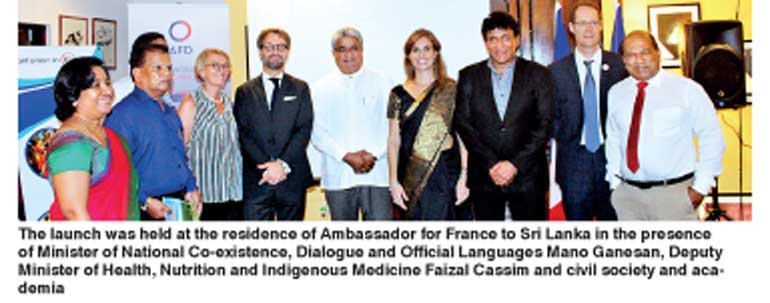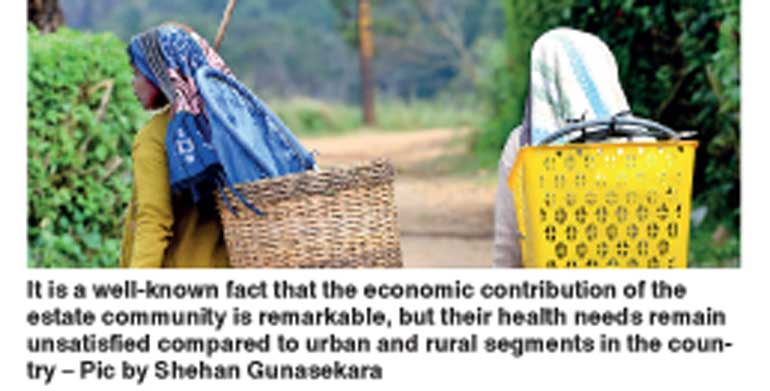Friday Feb 27, 2026
Friday Feb 27, 2026
Friday, 1 December 2017 00:58 - - {{hitsCtrl.values.hits}}

Médecins du Monde and the Human Development Organization (HDO) yesterday released a desk policy review on the healthcare delivery system in the plantation sector and the needed actions for improvement.
The launch was held at the residence of Ambassador for France to Sri Lanka in the presence of Minister of National Co-existence, Dialogue and Official Languages Mano Ganesan, Deputy Minister of Health, Nutrition and Indigenous Medicine Faizal Cassim and civil society and academia.
Sri Lanka maintains its high standards of health services and education with remarkable health and education indicators, and is identified as a country comparable with the developed world. A low maternal mortality ratio, low infant mortality rate, high literacy rate, and high life expectancy are some of the key achievements.
While this is well recognised and appreciated, still, women and young people in the plantation sector face significant barriers in accessing health services and specifically sexual and reproductive health and rights information and services, which create adverse effects on health and wellbeing of women and youth, violating some of their basic human rights.
Médecins du Monde (MDM), or Doctors of the World in English, is a French medical organisation working since 1980 to improve access to universal health care. MDM works in 44 countries across the globe and has been working in Sri Lanka since 2005.
In 2015, MDM started a Euro 1 m project co-funded by Agence Française de Développement (French Agency for Development, AFD). The AFD/MDM co-sponsored intervention is implemented by Human Development Organization (HDO), a local organisation working in the plantation sector in the Central Province of Sri Lanka, and MDM is also actively working in the Northern Province.
HDO is a rights-based non-governmental organisation situated in the plantation, promoting rights of plantation community since 1992. Among other things, by its action, HDO contributed to granting of Citizenship by the State of Sri Lanka of 265,000 plantation Tamil people in 2003.
The overall objective of the work MDM is doing in Sri Lanka with HDO is to improve awareness on sexual reproductive health mainly on knowledge about general SRH issues, service accessibility, availability, to reduce morbidity/mortality linked with STI, unwanted/early pregnancies and gender-based violence in the plantations, with a specific focus on women and youth. Following this, HDO commissioned two technical experts to conduct a desk policy review to highlight the current health system in the estate sector, challenges and needed actions for improvement.
Healthcare provision and standards existing in the estate sector is very far distanced from the national healthcare system in Sri Lanka in terms of quality and benchmarks. The estate population is considered a marginalised group in Sri Lanka as they lag behind in areas such as housing, safe drinking water, nutrition, sanitation and education.

It is a well-known fact that the economic contribution of the estate community is remarkable, but their health needs remain unsatisfied compared to urban and rural segments in the country. Twenty-five per cent (25%) of population in the plantation live without any sanitary facilities (HHI and ES 2012/2013), 35.9% of children under-five (U5) are underweight and the poverty headcount ratio in the estate sector is 10.9% vs 2.1% from urban and 7.6% from rural areas.
There is also a higher incidence of home deliveries (2.2%) in the estate sector compared to 0% in urban and 0.5% in rural areas (DHS 2006). This has created many socio-economic problems in the estate sector affecting the health of the children, adolescents and women in particular and the men.
Reproductive health services are reaching the estate population on a par with the national population. However, knowledge on sexual and reproductive health and its service provision among the women and youth are low in the estate sector compared to the rural and urban sectors. Lack of regular mechanism to deliver these services in the estate sector and lack of sexuality education in schools that contributes to low level of SRH knowledge especially for unmarried young people is highlighted in the review.
The desk policy review identified problematic areas existing in the health care delivery system in the estate sector with recommendations to the Government and/or the relevant stakeholders directly associated with the health of the estate community.
Full integration of the estate health sector into the Government system is the main solution identified along with the improvement of education, housing and infrastructure development inside the estates.
Presently, preventive health services of the estate sector are under the provincial health authority but the curative sector is still not completely under the national health system: although the nationalisation process of estate hospitals was initiated in the year 1996, there are numerous factors delaying the process of nationalisation.